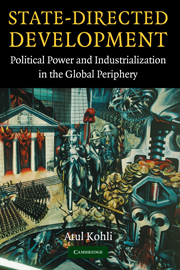Book contents
- Frontmatter
- Contents
- List of Tables and Figures
- Acknowledgments
- Introduction: States and Industrialization in the Global Periphery
- PART I GALLOPING AHEAD: KOREA
- PART II TWO STEPS FORWARD, ONE STEP BACK: BRAZIL
- PART III SLOW BUT STEADY: INDIA
- PART IV DASHED EXPECTATIONS: NIGERIA
- 8 Colonial Nigeria: Origins of a Neopatrimonial State and a Commodity-Exporting Economy
- 9 Sovereign Nigeria: Neopatrimonialism and Failure of Industrialization
- Conclusion: Understanding States and State Intervention in the Global Periphery
- Select Bibliography
- Index
8 - Colonial Nigeria: Origins of a Neopatrimonial State and a Commodity-Exporting Economy
Published online by Cambridge University Press: 05 September 2012
- Frontmatter
- Contents
- List of Tables and Figures
- Acknowledgments
- Introduction: States and Industrialization in the Global Periphery
- PART I GALLOPING AHEAD: KOREA
- PART II TWO STEPS FORWARD, ONE STEP BACK: BRAZIL
- PART III SLOW BUT STEADY: INDIA
- PART IV DASHED EXPECTATIONS: NIGERIA
- 8 Colonial Nigeria: Origins of a Neopatrimonial State and a Commodity-Exporting Economy
- 9 Sovereign Nigeria: Neopatrimonialism and Failure of Industrialization
- Conclusion: Understanding States and State Intervention in the Global Periphery
- Select Bibliography
- Index
Summary
At the heart of Nigeria's disappointing economic performance lies a poorly functioning state, characterized here as a neopatrimonial state. While the economic impact of this state's actions were manifested mainly in the second half of the twentieth century, the distortions were the product of earlier historical developments. This chapter reconsiders existing historical knowledge with the aim of elucidating, first, the nature of the political economies that the British carved into Nigeria and, second, the state and the economy that emerged in colonial Nigeria, both in the early colonial phase, which lasted until the onset of the Second World War, and in the late colonial phase, which ended with independence in 1960.
Three main themes emerge: one concerning the precolonial situation and two focused on the impact of British rule during the early and the late colonial phases. Although the British brought together highly diverse political economies that became Nigeria, the localized political economies shared some important traits: They were generally small-scale, relatively simple political units, and they were based on rather undeveloped technology. Of note, therefore, is the highly rudimentary quality of the polities and economies that would become Nigeria. While most scholars of development do not usually compare “levels of development” within “premodern” settings, it is important to do so. Nigeria at the turn of the twentieth century was at a much lower level of development than any of the other societies considered in this study.
- Type
- Chapter
- Information
- State-Directed DevelopmentPolitical Power and Industrialization in the Global Periphery, pp. 291 - 328Publisher: Cambridge University PressPrint publication year: 2004
- 1
- Cited by



